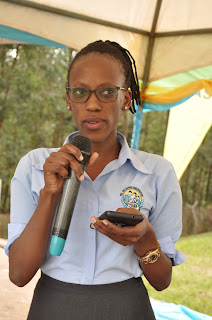What is COVID-19 anyway?

1. What is Coronavirus?
Coronaviruses
are a large family of respiratory viruses that cause diseases ranging from the
common cold to the Middle East Respiratory Syndrome (MERS) and the Severe Acute
Respiratory Syndrome (SARS). The current Coronavirus was identified as the
cause of a severe acute respiratory illness (now referred to as COVID-19) that
broke out in Wuhan City in China in December 2019. There are currently 45 confirmed cases of COVID-19 in Uganda.
2. How it is spread
Transmission
is through contact with nose or mouth droplets from infected people or
contaminated objects and surfaces around an infected person.
3. What are the symptoms?
The
commonest symptoms include a dry cough, fever, muscle aches and fatigue.
Difficulty in breathing occurs in severe disease.
4. Any vaccine or treatment
for it?
Currently
there is no vaccine or specific treatment for COVID-19. For all infected
persons, they should receive care to relieve the symptoms while those seriously
ill need to be quarantined/hospitalized.
5. How does one protect
themselves from getting infected?
By taking the precautionary measures provided
by the WHO and Uganda MoH including;
- Regularly and thoroughly wash your hands with soap and water for at least 20 seconds or use alcohol-based hand sanitizer.
- Maintain good respiratory hygiene by covering your mouth and nose while coughing and sneezing with a disposable tissue or into your flexed elbow.
- Maintain a safe social distance of at least 1 meter between yourself and anyone who is coughing or sneezing. Avoid handshaking, hugging and kissing with people who have flu like symptoms. Avoid close contact with anyone who has fever and cough.
- Persons with a cough or sneezing should stay home or keep a social distance and avoid mixing with others in a crowd.
- Avoid touching your face (eyes, nose and mouth) to prevent transmission.
- Regular disinfection of all working surfaces (e.g. workstations, tables in meeting rooms) with disinfectant/diluted bleach.
- Avoid all public gatherings, meetings and events including places of worship, social gatherings (weddings and funerals), crowded places e.g. shopping malls and entertainment premises.
- Limitation of visitors to hospitalized patients in both public and private hospitals.
- Avoid all non-essential travel, including local travel. Minimize congestion in public transport wherever possible.
- If you have fever, cough and difficulty breathing, seek medical care early and share travel history with your health care provider.
- Stay at home if you feel unwell with symptoms like fever, cough and difficulty in breathing for 14 days, which corresponds to the incubation period of Coronavirus.
People are
encouraged to stay updated with information from trusted sources e.g. Ministry
of Health, World Health Organization, Centers for Disease Control and
Prevention, etc.
7. Where to get tested if one has symptoms?
All
suspected Coronavirus cases are being referred to the Ministry of Health for
Uganda Virus Research Institute (UVRI) testing. If confirmed, the Ministry of
Health shall coordinate the referral process to an appropriate facility for
management of the disease.
8. Contacts for the
Ministry of Health?
The Ministry
of Health has provided the following toll-free lines to report any suspected
Coronavirus cases;
CALL
0800 100 066
0800 203 033
0800 303 033
Or 919
WhatsApp
0770 818 139
Alternatively,
you can send a free text message or Report to 8500.
They will provide the necessary guidance on Coronavirus,
including referral to the appropriate facilities, if Coronavirus is confirmed.

Comments
Post a Comment